Hire Desktop Support Specialists

Tier2Tek Staffing delivers direct hire Desktop Support Staffing for employers across the United States. We help organizations reduce operational risk by placing reliable, full time desktop support professionals who keep end users productive and IT environments stable.
Your Desktop Support Staffing Partner
Tier2Tek Staffing partners with employers to deliver direct hire only Desktop Support talent. Our focus is long term workforce stability, not temporary labor or contract staffing. Every candidate we present is evaluated for technical reliability, communication, and the ability to support business operations without disruption.
Employers use desktop support staffing services when internal hiring slows productivity, increases downtime, or exposes the organization to unnecessary risk. Desktop support professionals are often the first point of contact for employees experiencing system issues, which makes reliability and judgment critical.
With a national recruiting footprint, Tier2Tek supports organizations with on site, hybrid, and remote desktop support needs while maintaining consistent hiring standards across locations.
What Is a Desktop Support Staffing Agency

A desktop support staffing agency helps employers identify, evaluate, and hire professionals responsible for end user technical support. These roles directly impact uptime, employee satisfaction, and data security.
Unlike general recruiters, desktop support agencies understand the operational risks tied to poor troubleshooting, inconsistent documentation, and inadequate escalation practices.
How Desktop Support Staffing Agencies Work
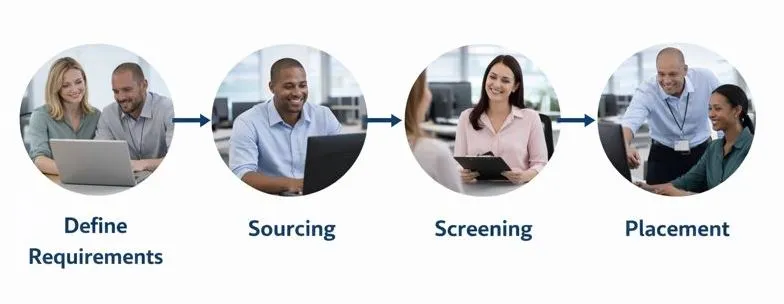
Desktop support staffing agencies follow a structured process to reduce hiring risk and ensure consistent results.
| Step | Description |
|---|---|
| Define Requirements | Clarify technical environment, support scope, and user expectations |
| Source Qualified Candidates | Identify professionals with relevant systems and support experience |
| Evaluate Technical Skills | Review hands on troubleshooting and platform knowledge |
| Screen for Industry Fit | Assess reliability, communication style, and accountability |
| Present Best Fit Candidates | Deliver only candidates aligned with business needs |
| Support the Direct Hire Process | Guide interviews and offer acceptance |
Common Mistakes Companies Make When Hiring Desktop Support
- Hiring based on tool familiarity instead of problem solving ability
- Underestimating the impact of poor communication on user confidence
- Treating desktop support as entry level without accountability expectations
- Ignoring documentation habits that affect long term support continuity
- Rushing hires during outages and accepting misaligned candidates
Why Companies Use Desktop Support Staffing Agencies

Employers rely on desktop support staffing agencies to reduce operational risk and hiring delays.
- Faster access to vetted professionals
- Reduced downtime caused by unfilled roles
- Better alignment between technical skills and business needs
- Improved retention through direct hire placement
- Lower internal recruiting workload
- Consistent candidate quality across locations
- Support during growth, refresh cycles, or restructuring
Desktop Support Positions We Staff
| Role | Key Skills or Tools | Typical Industries |
|---|---|---|
| Desktop Support Technician | Windows, macOS, ticketing systems | Corporate IT |
| IT Support Specialist | Troubleshooting, hardware support | Healthcare |
| Help Desk Analyst | Incident management, user support | Financial Services |
| End User Support Technician | Device provisioning, imaging | Manufacturing |
| Technical Support Analyst | Network basics, escalation | Technology |
| Field Support Technician | On site hardware support | Retail |
| Service Desk Technician | SLA management, documentation | Education |
| IT Operations Support | System monitoring, support tools | Logistics |
Types of Desktop Support Professionals and What They Do
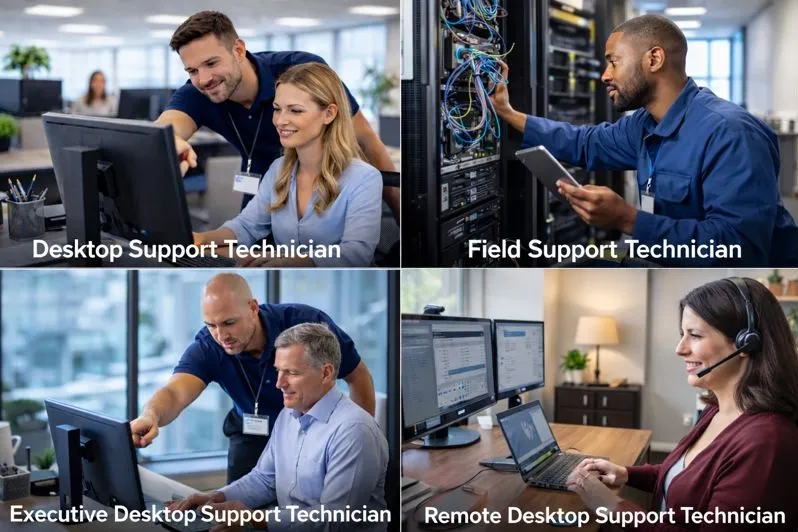
Desktop Support Technician
Provides hands on support for hardware, software, and user issues.
What separates high performing technicians is consistency under pressure and accurate documentation.
A commonly misunderstood responsibility is proactive issue prevention, not just reactive fixes.
IT Support Specialist
Supports broader systems while maintaining user facing responsibilities.
Average performers focus on tickets, while high performers recognize patterns that reduce repeat incidents and downtime.
Field Support Technician
Handles physical device support across multiple locations and environments.
Reliability and travel readiness are often more critical than advanced technical depth in this role.
Kiosk Support Technician
Supports shared-use systems such as kiosks, check-in stations, manufacturing terminals, and point-of-service devices.
High performers focus on uptime and preventive maintenance, not just break-fix responses.
Executive Desktop Support Technician
Provides dedicated support for executives and senior leadership.
What separates strong performers is discretion, urgency, and the ability to resolve issues without escalation or visibility.
Remote Desktop Support Technician
Supports distributed and hybrid workforces using remote access tools.
High-performing professionals diagnose issues efficiently without physical access while maintaining clear communication with users.
Industries We Serve
Tier2Tek supports desktop support hiring across multiple sectors:
- Technology
- Healthcare
- Financial services
- Manufacturing
- Education
- Government contractors
- Retail and eCommerce
- Logistics and transportation
- Professional services
Tools, Technologies, or Skills Used in Desktop Support
Desktop support professionals rely on a mix of technical tools and interpersonal skills.
| Tool or Skill | Primary Use |
|---|---|
| Windows OS | End user system support |
| macOS | Apple device troubleshooting |
| Active Directory | User and access management |
| Ticketing Systems | Issue tracking and resolution |
| Remote Support Tools | Off site troubleshooting |
| Hardware Imaging | Device deployment |
| Documentation | Knowledge continuity |
| Customer Communication | User confidence and clarity |
Why Work With Tier2Tek for Desktop Support Recruitment
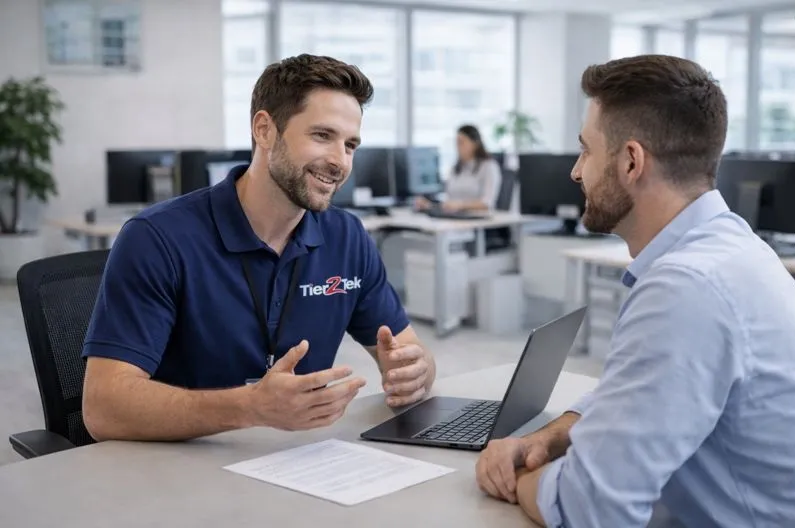
Tier2Tek Staffing focuses exclusively on direct hire desktop support recruitment.
- Direct hire staffing only
- Qualified candidates delivered within 1 to 2 business days
- No payment until you hire
- Best in class staffing agency standards
- Industry focused recruiters
- National recruiting coverage
- Transparent communication throughout the process
Where We Provide Desktop Support Staffing
Tier2Tek provides national desktop support staffing for employers across the United States. We recruit professionals for on site, hybrid, and remote environments based on your operational requirements.
Our national reach allows consistent hiring quality while adapting to regional labor markets and organizational scale.
How We Recruit Your Desktop Support Talent
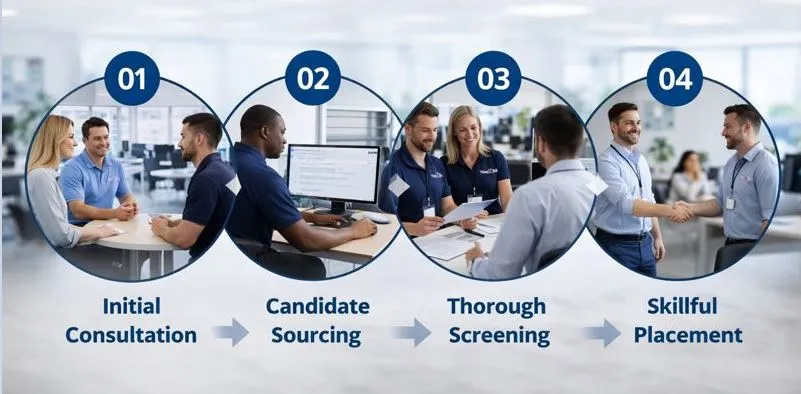
Our recruiting process is built to minimize risk and hiring delays.
- Understand Your Needs
- Source Candidates
- Screen for Fit
- Present Top Talent
Case Studies in Desktop Support Recruiting
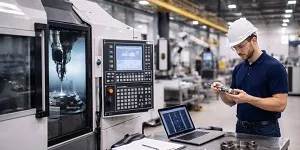
Manufacturing Firm
Challenge: Initial candidate pool lacked reliability during second shift coverage
Solution: Search criteria adjusted after feedback and schedule constraints
Result: Final hire aligned better with long term operational needs

Healthcare
Challenge: High ticket volume and user dissatisfaction
Solution: Hired a senior desktop support professional with healthcare systems experience
Result: Reduced resolution times and improved staff confidence

Financial Services
Challenge: Delayed hiring during a system refresh increased downtime
Solution: Focused on candidates with refresh and migration experience
Result: Stabilized rollout and reduced post deployment incidents
Desktop Support Staffing vs Related Staffing Services
Desktop support staffing differs from other IT hiring models.
| Desktop Support Staffing | Related IT Staffing |
|---|---|
| End user focused roles | Infrastructure focused roles |
| High interaction with employees | Limited user interaction |
| Reliability critical to operations | Project based priorities |
| Direct hire long term fit | Short term engagement focus |
FAQs About Desktop Support Staffing
Tier2Tek provides qualified candidates within 1 to 2 business days.
No. Tier2Tek provides direct hire staffing only.
Yes. Communication reliability is a core screening factor.
Yes. We recruit nationally for consistent results.
Yes. Our process scales to organizational size.
When Desktop Support Is Not the Right Hiring Solution
Desktop support roles are not appropriate when organizations need short term project labor, highly specialized engineering expertise, or fully outsourced IT operations without internal accountability.
About Tier2tek Desktop Support Recruiting Expertise
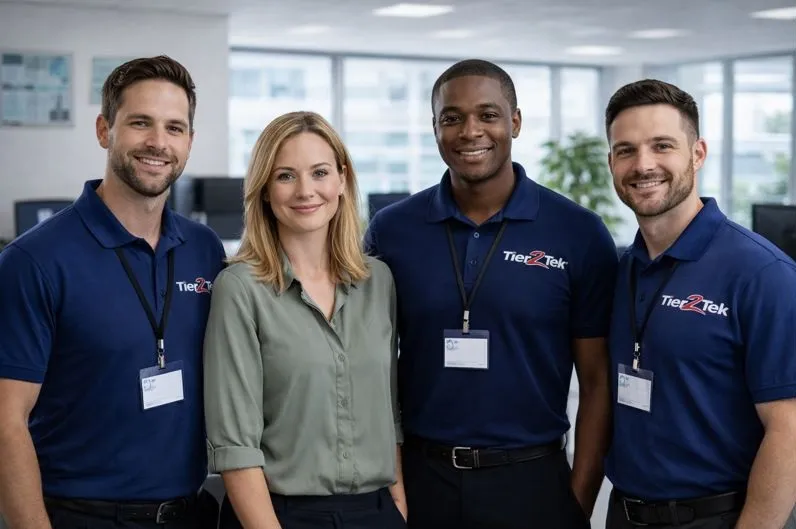
Tier2Tek Staffing has extensive experience recruiting across IT, engineering, CAD, cybersecurity, and professional technical roles. Our recruiters understand how desktop support performance directly impacts productivity, security posture, and employee satisfaction.
We focus on long term placement success by aligning technical ability with reliability, communication, and business awareness.
This content follows Tier2Tek Staffing’s internal publishing and review process. To learn more about how we create and update content, visit our Editorial Standards at https://tier2tek.com/about-us/editorial-standards/.
Get Started With Your Desktop Support Staffing Today
Build a reliable, risk aware desktop support team with Tier2Tek Staffing.
